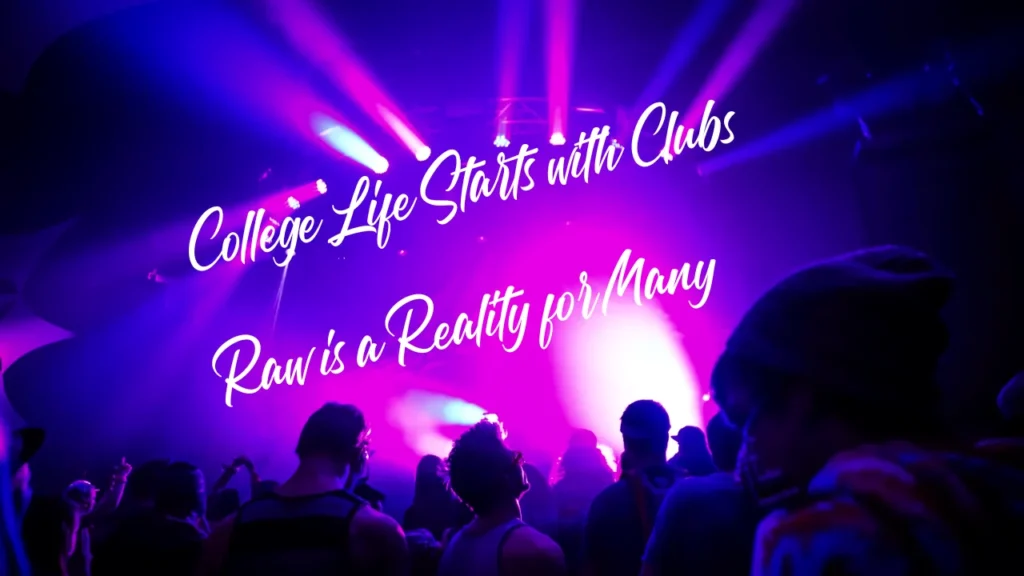College Life Starts With Clubs Raw Personal Development

College life is often viewed as a significant transition period in a student’s life. It is a time filled with new experiences, learning opportunities, and the chance to grow both personally and academically. However, one of the most essential aspects of college life that sometimes goes unnoticed is the role of clubs. The phrase college life starts with clubs raw captures the essence of this idea, emphasizing that clubs are not just an extracurricular activity but a vital part of the college experience.
What Does College Life Starts with Clubs Raw Mean
The phrase college life starts with clubs raw reflects the importance of clubs in shaping a student’s college journey. When students first enter college, they are often overwhelmed by the new environment, academic pressures, and social dynamics. Clubs provide a gateway to ease into college life, offering a raw and authentic experience that helps students connect with their peers, discover new interests, and build a sense of belonging.
Joining clubs is one of the first steps many students take to immerse themselves in college culture. These clubs serve as a platform where students can pursue their passions, whether it’s in the arts, sports, academics, or social causes. The “raw” aspect refers to the genuine and unfiltered experiences that clubs offer, which often play a crucial role in a student’s personal and professional development.
The Role of Clubs in College Life
Clubs are an integral part of college life because they offer students opportunities to explore their interests outside the classroom. These clubs often become a second home for students, where they can relax, have fun, and express themselves freely. “College life starts with clubs raw” because it is in these environments that students often find their voice, make lifelong friends, and even discover career paths they had never considered before.
For instance, a student interested in journalism might join the college newspaper club, where they can practice writing, learn about media, and gain real-world experience. Similarly, a student with a passion for music might join a band or music club, where they can hone their skills, perform, and connect with like-minded individuals. These clubs are not just about having fun; they provide practical experiences that can be invaluable in the professional world.
Academic and Social Life
Clubs play a dual role in enhancing both academic and social life. Academically, clubs can complement a student’s studies by providing additional learning opportunities. For example, an engineering student might join a robotics club where they can apply theoretical knowledge to practical projects. This hands-on experience not only reinforces what they learn in class but also makes them more competitive in the job market.
Socially, clubs are a great way to meet new people and build a network. College can be a daunting place, especially for freshmen who are new to the environment. By joining clubs, students can easily make friends who share similar interests. These connections often go beyond college, turning into professional networks that can be beneficial long after graduation.
Clubs on Personal Development
The phrase college life starts with clubs raw also emphasizes the impact of clubs on personal development. Through clubs, students learn essential life skills such as leadership, teamwork, communication, and time management. For instance, a student who takes on a leadership role in a club learns how to manage people, delegate tasks, and organize events. These are skills that are highly valued in the professional world and can give students an edge in their careers.
Moreover, clubs often challenge students to step out of their comfort zones. Whether it’s speaking in public, taking on a project, or collaborating with others, clubs push students to grow and develop confidence in their abilities. This personal growth is a significant part of the college experience and is often what students look back on fondly when they reflect on their college years.
College Life Starts with Clubs Raw is a Reality for Many

For many students, the reality is that college life starts with clubs raw. This phrase rings true because clubs often shape the college experience in ways that academics alone cannot. While academics are undoubtedly crucial, it is in clubs that students often find their passions, make meaningful connections, and develop skills that will serve them throughout their lives.
Clubs offer a break from the academic grind, allowing students to engage in activities they love and enjoy. This balance between work and play is essential for mental health and overall well-being. The “raw” aspect of clubs refers to the authenticity and spontaneity that these experiences bring, making college life richer and more fulfilling.
The Long-Term Benefits of Joining Clubs
The benefits of joining clubs extend far beyond the college years. The skills, experiences, and connections gained through club participation can have a lasting impact on a student’s life. For instance, many students who join professional or academic clubs often find that these experiences open doors to internships, job opportunities, and further education.
friendships and networks
Additionally, the friendships and networks formed in clubs often last a lifetime. These relationships can provide support, mentorship, and opportunities throughout a person’s career. The phrase college life starts with clubs raw underscores the idea that these experiences are foundational and can shape the trajectory of a student’s life in profound ways.
| Benefit | Description | Long-Term Impact |
|---|---|---|
| Academic Enhancement | Clubs provide practical experiences that complement academic learning, such as applying classroom knowledge to real-world projects. | Enhances understanding of academic subjects and improves employability. |
| Social Connections | Joining clubs helps students meet new people, make friends, and build a supportive network of peers with similar interests. | Creates lasting friendships and professional networks that extend beyond college. |
| Personal Development | Clubs offer opportunities to develop essential life skills such as leadership, teamwork, communication, and time management. | Builds confidence and prepares students for leadership roles in their future careers. |
| Career Preparation | Participation in professional or academic clubs often leads to internships, job opportunities, and further education. | Opens doors to career advancement and provides valuable professional experience. |
| Mental Health and Well-Being | Clubs offer a balance between academics and extracurricular activities, allowing students to engage in activities they enjoy. | Supports overall well-being and reduces stress by providing a healthy work-life balance. |
| Exploration of Interests | Clubs allow students to explore and pursue their passions, whether in arts, sports, academics, or social causes. | Helps students discover potential career paths and personal interests that shape their future. |
| Community and Belonging | Being part of a club fosters a sense of belonging and community, making college life more enjoyable and fulfilling. | Enhances the overall college experience and creates a strong support system. |
The crucial role of Clubs in College Life
As colleges continue to evolve, the role of clubs is likely to become even more significant. With the increasing emphasis on holistic education and the development of soft skills, clubs will play a crucial role in preparing students for the challenges of the modern world. The phrase “college life starts with clubs raw” will continue to resonate as students seek out genuine and impactful experiences that go beyond the classroom.
In the future, we can expect to see more diverse and specialized clubs that cater to the evolving interests and needs of students. Virtual clubs may also become more prevalent, offering opportunities for students to connect and collaborate across campuses and even countries. The essence of “college life starts with clubs raw” will remain, as clubs continue to be a space where students can explore, grow, and thrive.
Frequently Asked Questions
Why is joining clubs important in college?
Joining clubs is important because it enhances both academic and social experiences, helps in personal development, and provides opportunities to build valuable networks and discover new interests.
How can clubs benefit my future career?
Clubs offer practical experiences, leadership opportunities, and networking connections that can lead to internships, job offers, and further education, helping to prepare you for your future career.
What types of clubs should I consider joining in college?
Consider joining clubs that align with your interests, whether they are academic, professional, cultural, or hobby-based, as these can provide personal satisfaction and contribute to your overall growth during college.
Conclusion
College life starts with clubs raw is more than just a phrase; it is a reality for many students who find that their college experience is defined by the clubs they join. These clubs offer a unique blend of academic enrichment, social connection, and personal development that is essential to the college journey. As students navigate the challenges and opportunities of college life, clubs provide a foundation for growth, learning, and lasting memories. Whether it’s discovering a new passion, building lifelong friendships, or gaining practical skills, the impact of clubs on college life is undeniable.





